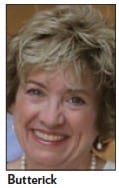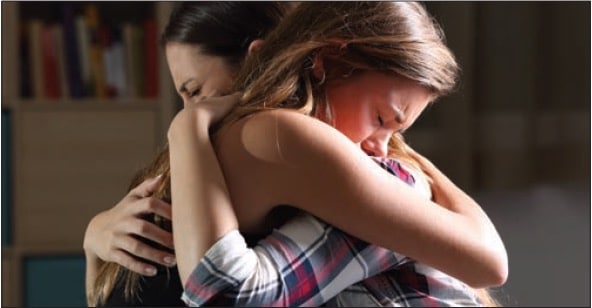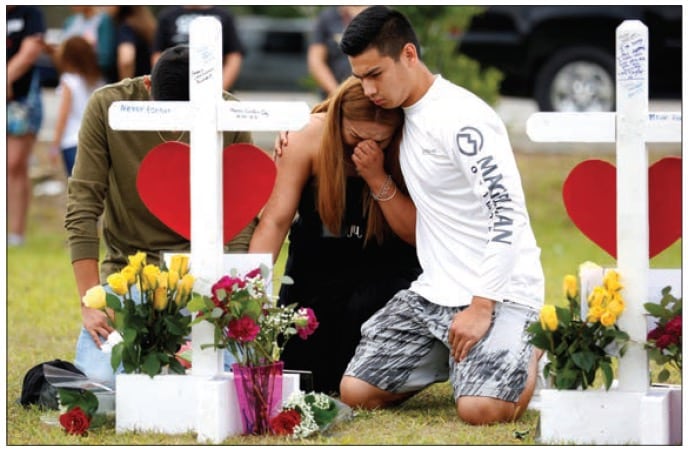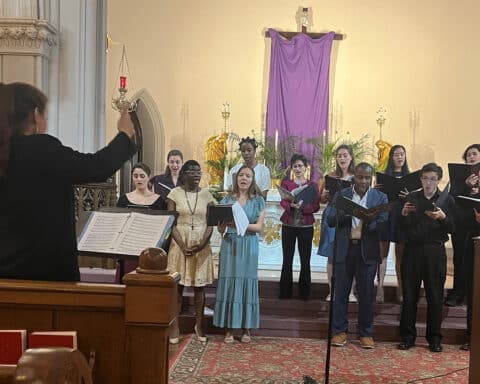As the United States grapples with the horror of another mass shooting at a high school, this time on May 18 at Santa Fe High School near Houston, a familiar narrative emerges. The suspect is 17-year-old Dimitrios Pagourtzis, a student who reportedly struggled socially. In the words of Texas Gov. Greg Abbott, Pagourtzis “advertised his intentions but somehow slipped through the cracks” in terms of the disturbing content he allegedly had posted to social media.
We’ve been here before, and recently.
Nikolas Cruz, the young man accused of committing a shooting rampage at Marjory Stoneman Douglas High School in Parkland, Florida, on Feb. 14, suffered from mental health issues for years. In fact, in 2016 school officials and a sheriff’s deputy recommended that he be involuntarily committed for the purposes of a mental evaluation. His erratic behavior even drew the attention of the FBI.
While this certainly is an extreme example of what can happen when mental health problems go untreated, it is a profound sign of a much larger issue in our country: the rise in mental health problems among young people, and the severe lack of available resources for treatment. Would things have been different if these teens had received the help they needed?
Throughout the country, at all levels, the Catholic Church is stepping up to do its part in meeting this need. Schools, parishes, lay Catholic psychologists, dioceses and even the U.S. Conference of Catholic Bishops are implementing programs, training those in positions of authority and increasing the availability of help for young and old in need of mental health services.
Lack of connection

Among young people today, one of the biggest problems they face is isolation, according to Greg Popcak, founder and director of CatholicCounselors.com. This is a mental health issue, as it “results in both depression and anxiety,” he told Our Sunday Visitor. “The human brain is designed to emphasize negative information except if we feel connected to others.” He described an example: If one is alone in the forest, it is safest to be hyper-alert to possible dangers. “But if we’re in the forest with our tribe, someone has our back, we can relax.”
“Today,” he said, “millennials have no tribe.” Many do not even trust that their parents will be there for them, as this is the third generation of the culture of divorce. “Additionally, because they have been left to their own devices so much, social media has served as their surrogate parent,” Popcak said. “When combined with strong family relationships, social media can enhance face-to-face relationships; but without them, social media actually makes people less social.”
For Popcak, this isolation, and the sense of a lack of belonging, is at the heart of the rampant mental health problems among young people today. He observed that the fiction that has been so definitive for this generation — “Harry Potter,” “The Hunger Games,” “A Series of Unfortunate Events,” “Twilight” — all share a core theme: children, either abandoned by adults or surrounded by incompetent adults, who must dedicate their entire lives to saving themselves and the adults who failed them.
“This phenomenon isn’t a freak of marketing,” Popcak said. “Millennials are the first generation who, since birth, were fed the poisoned fruit of the culture of divorce, the sexual revolution and secular feminism — all of which professed that children will take care of themselves as long as the adults focus on their own happiness and fulfillment.” Very few generations have had to raise themselves this way, he said.
Core relationships, values
There is hope, according to Popcak. “People are becoming aware of the problem,” he said. “But there is a lot of ground to cover before millennials can learn the relationship skills that basic mental health requires.”
What is needed is a reclamation of the value of family life, Popcak said. The Catholic faithful — and, by extension, the world — must rediscover the fact that family life “doesn’t just happen because you live under the same roof and share a data plan. Family life is what happens when parents and children make a commitment to prioritize regular daily and weekly time to work, play, talk and pray together.” Families must cultivate deep and fulfilling relationships in the home, through an intentional commitment to rituals of connection.
Popcak also noted the importance of finding a therapist — for those who choose to seek one — who respects their faith. This is “critical to pursuing healing in a manner that doesn’t just solve the immediate problem, but helps to support your desire to be a fully formed, healthy person,” he said. Too often, if a therapist does not know how to integrate the individual’s spiritual tradition, they will give advice that ultimately alienates a person from their most significant relationships, their core values and their faith community. “People of faith should, ideally, seek help from a pastoral counselor (a licensed mental health counselor who has additional, graduate, theological training).”
Anxiety uptick
The Diocese of Memphis, Tennessee, is one that is making great efforts toward providing mental health services for the young people in its care. Colleen Butterick, the director of counseling for the Catholic schools in the diocese, has a background that makes her uniquely qualified for such an undertaking.

Over the course of her 20 years as director, she said, “we have seen an increase exponentially in the number of emotional difficulties that children are experiencing.” Before becoming director, while she was a school counselor, she would occasionally encounter cases of extreme anxiety — perhaps separation anxiety or school-related anxiety — but even that was minimal, she said.
Now, the cases are so severe and so common, she said, that “I cannot tell you how often I have to say to the principals and counselors (in a very loving way) that we are not a treatment facility.” There has been a significant increase in generalized anxiety and depression; parents call the schools asking for help for their children.
In the Diocese of Memphis, there are 24 schools and 25 counselors. Not every school has a counselor, and some of the high schools have as many as three. Many of these counselors are fresh out of school, and as a result they come out with a better sense of the world we live in than their predecessors may have had. One problem faced by the counselors stems directly from the lack of services available for young people: There is a high demand for the counselors to serve in a treatment role.
There are two primary reasons for this, according to Butterick: It often is difficult for the parents to find services for their child outside the school; and even when services are found, they are poor in quality and prohibitively expensive. While the counselors are not able to give treatment to the students, there is a lot they can do to make the students feel safe and cared for during the school day.
“Between 8 a.m. and 3 p.m., we know we’re safe, physically and emotionally, regardless of what’s going on out there in the crazy world,” she said.
Seeing the need
Father Mark Searles has a unique perspective on the issues faced by young people today and the need for mental health resources during those formative years. A priest of the Diocese of Allentown, Pennsylvania, he is chaplain and director of Campus Ministry at Allentown Central Catholic High School. He is in his second full year of high school ministry.
“As a chaplain, I do see the need for mental health resources for young people on a regular basis,” Father Searles said. The local Catholic Charities branch provides counseling resources to the school and makes a weekly visit to give students the opportunity to see a counselor with their parents’ permission. Father Searles meets students regularly who are wrestling with challenging situations at home and in their relationships with others.
| California bishops speak out |
|---|
|
On May 1, the bishops of California released a pastoral letter called “Hope and Healing: On Caring for those who Suffer from Mental Illness.” “As pastors and bishops,” the letter — addressed to “All Catholics and People of Goodwill” — opens, “we are deeply concerned with the heartbreaking prevalence of mental illness in our society and are taking action to address this tragic form of misery and sorrow. Though not as apparent and familiar as general medical problems, mental illness is equally important and is uniquely challenging and burdensome.”
The letter can be seen as a mission statement of the bishops, as well as a call of companionship and accompaniment with those who suffer. “Those living with a mental illness should never bear these burdens alone,” the bishops write, “nor should their families who struggle heroically to assist their loved ones.” The letter cites figures from the National Institute of Mental Health that 1 in 5 adults in the U.S. suffered from a mental disorder in the past year, and nearly 10 million adults have a severe mental illness that causes functional impairment. Addressing the question of young people, they write: “Fully 20 percent of adolescents currently have, or previously had, a seriously debilitating mental disorder.” Young people are disproportionately impacted by rising rates of depression and anxiety, the bishops add. While there is space given to the importance of professional help, the bishops also emphasize the necessity of pastoral care and spiritual direction. “The sacramental life of the Church, especially the frequent reception of the Eucharist, the Sacrament of the Sick, and the Sacrament of Reconciliation, provide grace and spiritual strength to all who receive them, and especially to those who suffer mentally or physically.” Services are important, and desperately needed — both mental as well as spiritual.
|
Father Searles also serves as a member of the Student Assistance Program, which is a faculty team meant to offer guidance to students and foster a safe and drug-free environment with mental health and wellness as a focus. This program “allows students or teachers to make anonymous referrals in a healthy and organized way when they see their students/peers struggling in some way,” Father Searles explained. This work also has given him insight into the lack of available resources for young people, “as some counselors have noted the increased demand for such services and a smaller pool of counselors who are willing or qualified to work with young people.”
While Father Searles’ office is open to the students, and they often stop by for either a piece of candy or a serious conversation, he makes himself available whenever they might want to talk about “their lives, their dreams and their concerns,” he said. “Some of the best conversations happen at sporting events or retreats or other activities outside of school when the students are more relaxed and not worried about a quiz or assignment that is due.”

How teens relate
Availability and connection is important, as Father Searles also sees a correlation between the rise in mental health issues among young people and the increase use of technology and social media. “Some teenagers have now spent their whole lives communicating with a screen in front of their face in place of the face of another person,” he said, “and it has damaged their ability to look another person in the eye and hold a sincere conversation.”
He notes a big difference in interacting with a social and outgoing teenager who has had very limited screen time as a child.
“Teenagers have been conditioned to see the world through their devices instead of looking up and seeing the world with their own eyes and their own experiences,” he said. “Even their participation in Mass and prayer has both become more challenging but even more necessary now than ever to take the time to unplug and lift up their hearts and minds to Christ.”
The problems facing teens do not exist solely as a symptom or result of social media. Nor do they end at a lack of social ability. There is a serious problem of mental health among many young people today, and a dramatic dearth of available resources.
Father Searles recognizes that he is not simply serving in a secular context, which provides a unique opportunity. “Our greatest resource as a Catholic high school is Jesus Christ himself, particularly in Eucharistic adoration,” he said. “Teenagers have become experts at sitting still and staring at their devices, so I believe on of the best things we can do is to ask them to sit still and stare into the presence of Jesus Christ in the Most Blessed Sacrament.”
It is essential, he said, for students to unplug and refocus, and when they do this in the presence of the Blessed Sacrament, “the fruits of adoration are very evident and inspiring. Having the Eucharist as the heart of our school has been a powerful remedy to the mental health concerns, stress and just overwhelming schedules and demands placed on young people today.”
The whole person
Resources for youth are very limited, but the real issue is early prevention and intervention, according to Matt Holzmann, vice chair of the Orange County Mental Health Board and executive with the National Alliance on Mental Illness (NAMI) Orange County.

The emphasis in Orange County is on educating teachers, peers, parents and others in knowing the signs of a mental health crisis. Noted Holzmann, “Empathy, communication and compassion will all help us to raise healthier, happier children and youth who can then carry on the ministry of mental wellness.”
In the Diocese of Orange, in Southern California, they have created a diocesan Mental Health Advisory Board, which has enabled better support, information sharing and animating of mental health ministries at the parish level, according to Greg Walgenbach, the diocesan director of life, justice and peace.
Additionally, the Office of Youth and Young Adult Ministry has worked to bring training and resources on suicide, substance abuse, domestic violence and other areas of behavioral health to youth ministers and youth ministries. “We want to see more of those efforts move forward,” he said.
It all comes down to remembering and safeguarding the dignity of the human person and meeting people where their needs are the strongest.
“Our Whole Person Care Initiative is attending to particular needs at the end of life, for those suffering, and, including often, caregivers. Overall, as Bishop [Kevin W.] Vann has reiterated often, the goal is to ‘see’ people, ‘see’ one another. The question is not first, ‘What is your condition?’ but ‘Who are you?'” Walgenbach said.
The end result, he added, is a culture shift.
“We are shifting the culture of the parishes to reduce the stigma that characterizes the response of the broader culture and to emphasize accompaniment and profound hospitality.”
Paul Senz writes from Oregon.
| National efforts |
|---|
|
Beyond the diocesan level, bishops around the country are working together to confront mental illness, the lack of resources and the need to treat every person with the dignity they deserve. Meghan Goodwin is a policy adviser for the Office of Domestic Social Development of the U.S. Conference of Catholic Bishops (USCCB).”The Catholic Church in the United States, broadly, has consistently provided pastoral care to those who suffer from mental illness through its charitable nonprofits and through her priestly ministry,” Goodwin told OSV. Among other things, the USCCB recently has started a coalition of different organizations to address mental illness and mental health. This includes Catholic Charities USA, the National Catholic Partnership on Disability, the Catholic Health Association and the Society of St. Vincent de Paul. “As Catholics, we don’t have this neo-Platonic view that we have to escape from the flesh and ascend to the purely spiritual realm,” Goodwin said. “We have to embrace that we live in bodies, and our bodies — as well as our brains, our minds — have to get the treatment they need; you can’t just treat the soul in isolation.” But neither can the soul be neglected. Cooperation with mental health professionals is key, Goodwin said, but as Catholics there is something unique the Church can bring to the table. “There’s a spiritual dimension to mental illness,” she said. “Sometimes things manifest on the spiritual level — severe anxiety can manifest as scrupulosity; someone who is depressed can feel like God is rejecting them; and this spiritual need must be met.” “To trust in God’s mercy, without presuming upon God’s mercy — that balance can be the difference between life and death for someone going through their darkest hours.” And this is something the Church can provide that cannot be found anywhere else. Mental illness is not something to be stigmatized, but rather it is just that: an illness that profoundly affects a brother or sister in Christ, as well as those around them, and those individuals deserve the dignity that comes from being made in God’s image. |


 This letter is the chief and most visible effort by the bishops throughout California, working in tandem, to address the issue of mental illness.
This letter is the chief and most visible effort by the bishops throughout California, working in tandem, to address the issue of mental illness.


